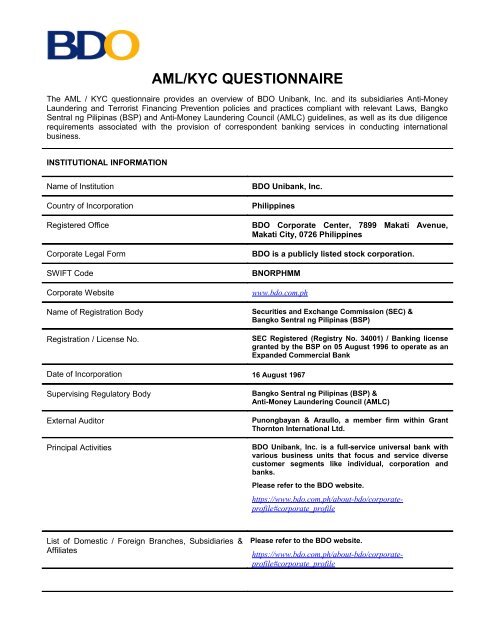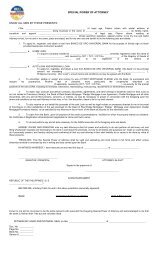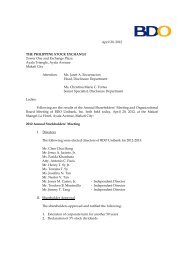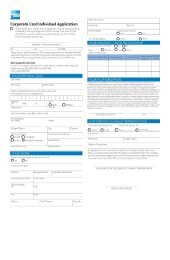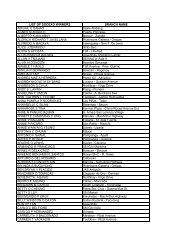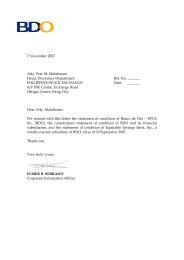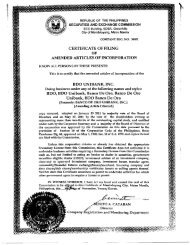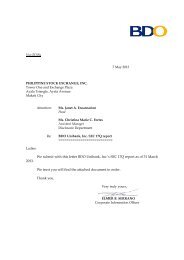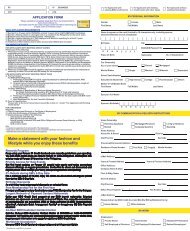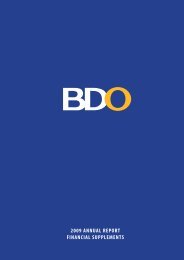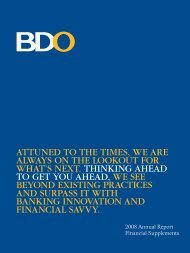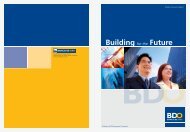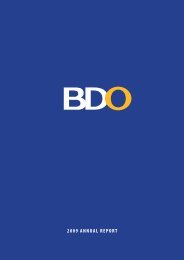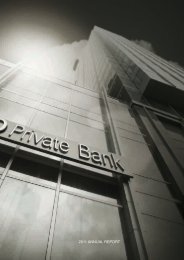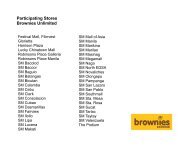bdo aml/kyc questionnaire
bdo aml/kyc questionnaire
bdo aml/kyc questionnaire
Create successful ePaper yourself
Turn your PDF publications into a flip-book with our unique Google optimized e-Paper software.
AML/KYC QUESTIONNAIRE<br />
The AML / KYC <strong>questionnaire</strong> provides an overview of BDO Unibank, Inc. and its subsidiaries Anti-Money<br />
Laundering and Terrorist Financing Prevention policies and practices compliant with relevant Laws, Bangko<br />
Sentral ng Pilipinas (BSP) and Anti-Money Laundering Council (AMLC) guidelines, as well as its due diligence<br />
requirements associated with the provision of correspondent banking services in conducting international<br />
business.<br />
INSTITUTIONAL INFORMATION<br />
Name of Institution<br />
Country of Incorporation<br />
Registered Office<br />
Corporate Legal Form<br />
SWIFT Code<br />
Corporate Website<br />
Name of Registration Body<br />
Registration / License No.<br />
BDO Unibank, Inc.<br />
Philippines<br />
BDO Corporate Center, 7899 Makati Avenue,<br />
Makati City, 0726 Philippines<br />
BDO is a publicly listed stock corporation.<br />
BNORPHMM<br />
www.<strong>bdo</strong>.com.ph<br />
Securities and Exchange Commission (SEC) &<br />
Bangko Sentral ng Pilipinas (BSP)<br />
SEC Registered (Registry No. 34001) / Banking license<br />
granted by the BSP on 05 August 1996 to operate as an<br />
Expanded Commercial Bank<br />
Date of Incorporation 16 August 1967<br />
Supervising Regulatory Body<br />
External Auditor<br />
Principal Activities<br />
Bangko Sentral ng Pilipinas (BSP) &<br />
Anti-Money Laundering Council (AMLC)<br />
Punongbayan & Araullo, a member firm within Grant<br />
Thornton International Ltd.<br />
BDO Unibank, Inc. is a full-service universal bank with<br />
various business units that focus and service diverse<br />
customer segments like individual, corporation and<br />
banks.<br />
Please refer to the BDO website.<br />
List of Domestic / Foreign Branches, Subsidiaries &<br />
Affiliates<br />
Please refer to the BDO website.<br />
https://www.<strong>bdo</strong>.com.ph/about-<strong>bdo</strong>/corporateprofile#corporate_profile<br />
https://www.<strong>bdo</strong>.com.ph/about-<strong>bdo</strong>/corporateprofile#corporate_profile
OWNERSHIP AND MANAGEMENT INFORMATION<br />
Stock Exchange Listing<br />
Ownership Structure<br />
Management Structure<br />
Philippine Stock Exchange (PSE), under the trading<br />
name of BDO Unibank, Inc. & BDO as the stock code.<br />
Please refer to the BDO website.<br />
https://www.<strong>bdo</strong>.com.ph/corporate-governance/ownership<br />
Please refer to the BDO website.<br />
List of Directors:<br />
https://www.<strong>bdo</strong>.com.ph/corporate-governance/board-andshareholder-matters<br />
Principal Officers:<br />
https://www.<strong>bdo</strong>.com.ph/corporate-governance/ownership<br />
then click Annual Stockholder Meeting (DIS)<br />
Anti-Money Laundering Questionnaire<br />
I. General AML Policies, Practices and Procedures: Yes No<br />
1. Is the AML compliance program approved by the FI’s board or a senior committee<br />
2. Does the FI have a legal and regulatory compliance program that includes a designated<br />
officer that is responsible for coordinating and overseeing the AML framework<br />
3. Has the FI developed written policies documenting the processes that they have in place<br />
to prevent, detect and report suspicious transactions<br />
4. In addition to inspections by the government supervisors/regulators, does the FI client<br />
have an internal audit function or other independent third party that assesses AML<br />
policies and practices on a regular basis<br />
5. Does the FI have a policy prohibiting accounts/relationships with shell banks (A shell<br />
bank is defined as a bank incorporated in a jurisdiction in which it has no physical<br />
presence and which is unaffiliated with a regulated financial group.)<br />
6. Does the FI have policies to reasonably ensure that they will not conduct transactions<br />
with or on behalf of shell banks through any of its accounts or products<br />
7. Does the FI have policies covering relationships with Politically Exposed Persons<br />
(PEP’s), their family and close associates<br />
8. Does the FI have record retention procedures that comply with applicable law<br />
9. Are the FI’s AML policies and practices being applied to all branches and subsidiaries of<br />
the FI both in the home country and in locations outside of that jurisdiction<br />
Our policy applies to all local and foreign branches and subsidiaries of BDO. Our foreign<br />
branches and subsidiaries abroad also comply with the AML laws, rules and regulations<br />
of their respective host countries/jurisdictions.
10. Is money laundering and terrorist financing considered a crime in you country<br />
11. Has your country established laws designed to prevent money laundering and terrorist<br />
financing<br />
12. If ‘Yes’ to Question 11, please indicate the official name of the law which regulates AML<br />
procedure in your country and the date on which this law and subsequent amendments,<br />
if any, were passed / gazetted.<br />
1. Republic Act (R.A.) No. 9160: The Anti-Money Laundering Act of 2001 with the following<br />
amendments:<br />
a. R.A. No 9194: An Act Amending Republic Act No. 9160 (effective 2003)<br />
b. R.A. 10167: An Act to Further Strengthen the Anti-Money Laundering Law<br />
(took effect on 06 July 2012)<br />
c. R.A. 10365: An Act Further Strengthening the Anti-Money Laundering Law<br />
(effective on 19 April 2013)<br />
2. R.A. 10168: The Terrorism Financing Prevention and Suppression Act of 2012<br />
(took effect on 05 July 2012)<br />
3. BSP Circular No. 706: Updated Anti-Money Laundering Rules and Regulations<br />
(took effect on 05 January 2011)<br />
13. Is your institution subject to such laws designed to prevent money laundering and<br />
terrorist financing<br />
14. In case of conflict between your Home Country AML/CFT laws and / or regulations and<br />
the local laws and / or regulations in the foreign jurisdiction where you have branches or<br />
subsidiaries, do you apply the highest standard<br />
15. Are the FI’s AML policies and procedures according to local laws, rules, standards and<br />
benchmark against international standards<br />
16. Does the FI have a policy prohibiting anonymous accounts<br />
17. How long are records kept<br />
All transactions records are preserved for at least five (5) years from the dates of<br />
transactions. For closed accounts, client identification, account files and business<br />
correspondences are maintained for at least five (5) years from the dates when<br />
they were closed.<br />
18. Is implementation of AML policies and procedures consistently updated wherever there<br />
are new laws and regulations<br />
19. Has the FI been cited by your regulatory agency for any violation of AML laws, rules or<br />
regulations in the past 5 years
II. Risk Assessment Yes No<br />
20. Does the FI have a risk-based assessment of its client base and their transactions<br />
21. Does the FI determine the appropriate level of enhanced due diligence necessary for<br />
those categories of clients and transactions that the FI has reason to believe<br />
pose a heightened risk of illicit activities at or through the FI<br />
III. Know Your Client, Due Diligence and Enhanced Due Diligence Yes No<br />
22. Has the FI implemented processes for the identification of those clients on whose behalf<br />
it maintains or operates accounts or conducts transactions<br />
23. Does the FI have a requirement to collect information regarding its clients’ business<br />
activities<br />
24. Does the FI assess its FI clients’ AML policies or practices<br />
25. Does the FI have a process to review and, where appropriate, update client information<br />
relating to high risk client information<br />
26. Does the FI have procedures to establish a record for each new client noting their<br />
respective identification documents and ‘Know Your Client’ information<br />
27. Does the FI complete a risk-based assessment to understand the normal and expected<br />
transactions of its clients<br />
28. Does the FI take steps to understand the normal and expected transactions of its clients<br />
based on its risk assessment of its clients<br />
29. Does the FI require the presentation of identification documents issued by official<br />
authority<br />
30. Does the FI provide services to “walk – in” clients<br />
31. If ‘Yes’ to Question 30, does your institution identify them<br />
We entertain walk-in clients but before we start any relationship with them, we<br />
establish their true identity through proper KYC.<br />
32. Does the FI follow FATF recommendations on money laundering and terrorist financing<br />
33. Does the FI provide services to Offshore Banks, Internet Banking based institutions or<br />
banks located in high risk areas as highlighted by FATF<br />
34. Does the FI identify and verify the transactions related to persons / entities suspected of<br />
ML / TF, comprised in official lists of appropriate authorities<br />
35. Does the FI have a process to review and, where appropriate, update client information<br />
relating to high risk client information<br />
36. Does the FI identify and verify the transactions related to persons / entities suspected of<br />
ML / TF
37. Does the FI ensure that effective anti-money laundering and counter-terrorism controls<br />
are in place on new technologies and when dealing in non-face to face interactions or<br />
through intermediaries<br />
38. Does your compliance program include establishing policies, procedures and processes<br />
for managing Economic & Trade Sanctions<br />
If ‘Yes’ please indicate the Sanctions program(s) incorporated in your compliance<br />
program:<br />
OFAC, United Nations Security Council and FATF<br />
39. Do you screen your clients and transactions including telegraphic transfer against a<br />
particular Sanctions program<br />
If ‘Yes’, please indicate the Sanctions program(s) used:<br />
OFAC and United Nations Security Council<br />
40. How frequent does the FI screen its existing client database<br />
Daily and when there are new accounts opened.<br />
41. Do you include originator information with outgoing wire transfer<br />
42. If ‘Yes’ to Question 41, are you required by your local regulator to do so<br />
IV. Reportable Transactions and Prevention and Detection of Transactions with<br />
Illegally Obtained Funds<br />
43. Does the FI have policies or practices for the identification and reporting of transactions<br />
that are required to be reported to the authorities<br />
44. Is the FI mandated to report transactions above a certain thresholds<br />
45. If ‘Yes’ to Question 44, does the FI have procedures to identify transactions structured to<br />
avoid such obligations<br />
46. Does the FI have a monitoring program for unusual and potentially suspicious activity<br />
that covers funds transfers and monetary instruments such as travelers checks, money<br />
orders, etc<br />
47. Does the FI ensure the confidentiality of Suspicious Transaction Report (STR) filings or<br />
any information that would reveal the existence of a STR<br />
Yes<br />
No<br />
V. Correspondent Banking Relationship Yes No<br />
48. Does the FI have policies to reasonably ensure that it only operates with correspondent<br />
banks that possess licenses to operate in their countries of origin<br />
49. Does the FI allow direct use of the correspondent account by third parties to transact<br />
business on their behalf (Payable-through accounts)<br />
50. Does the FI have a standard AML / KYC <strong>questionnaire</strong> that is provided to correspondent<br />
banks
VII. AML Training Yes No<br />
51. Does the FI provide AML training to relevant employees that includes:<br />
<br />
<br />
<br />
Identification and reporting of transactions that must be reported to government<br />
authorities.<br />
Examples of different forms of money laundering involving the FI’s products and<br />
services.<br />
Internal policies to prevent money laundering.<br />
52. Does the FI retain records of its training sessions including attendance records and<br />
relevant training materials used<br />
53. Does the FI communicate new AML related laws or changes to existing AML related<br />
policies or practices to relevant employees<br />
54. Does the FI employ third parties to carry out some of the functions of the FI<br />
55. If the answer to question 54 is yes, does the FI provide AML training to relevant third<br />
parties that includes:<br />
<br />
<br />
<br />
Identification and reporting of transactions that must be reported to government<br />
authorities.<br />
Examples of different forms of money laundering involving the FI’s products and<br />
services.<br />
Internal policies to prevent money laundering.<br />
The Bank outsources some of its functions except those that are inherently bank<br />
functions (e.g. Deposit related operation). The Bank however does not provide<br />
AML training to these relevant agents. If these service providers are covered<br />
institutions as defined under the Anti-Money Laundering Act, as amended, they<br />
are mandated to conduct their own AML Training.<br />
VIII. Contact Details Yes No<br />
56 Has the FI appointed a Compliance Officer for the AML / KYC program<br />
57 If yes, please give the name and title of Compliance Officer responsible for the AML /<br />
KYC program and his / her contact details for future references.<br />
Name:<br />
Title:<br />
E-mail:<br />
Address:<br />
Phone No: +63 2 878-4803<br />
Fax No: +63 2 878-4205<br />
Rebecca S. Torres<br />
Senior Vice President and Chief Compliance Officer<br />
torres.becky@<strong>bdo</strong>.com.ph<br />
14 th Floor, BDO North Tower, BDO Corporate Center<br />
7899 Makati Avenue, Makati City, 0726 Philippines<br />
Signature: _______________________________<br />
Date: 04 July 2013
CERTIFICATION<br />
I, REBECCA S. TORRES, Senior Vice President and Chief Compliance Officer of<br />
BDO Unibank, Inc., do hereby certify the following:<br />
• That the answers and statements made in our AML / KYC Questionnaire are<br />
complete, accurate to the best of our knowledge and reflective of our Anti-<br />
Money Laundering & Know Your Client policies, procedures and program.<br />
• That all Officers and Staff of our bank are aware of these policies, procedures<br />
and program and there is an adequate compliance oversight process in place.<br />
• That we also require our correspondent banks and tie-ups with which we do<br />
business maintain procedures for such purpose.<br />
• That I am the duly authorized officer of BDO Unibank, Inc. to complete and<br />
execute the AML KYC Questionnaire<br />
REBECCA S. TORRES<br />
SVP and Chief Compliance Officer


